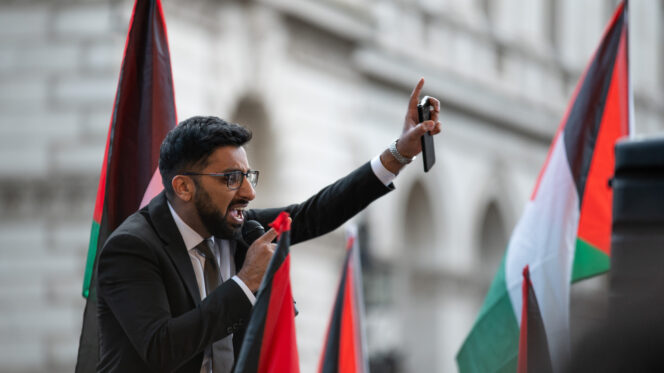Revealed: the Real ‘Two-Tier Policing’
New exclusive data shows how climate protesters, not the far-right, are being silenced.
by Simon Childs
19 November 2025
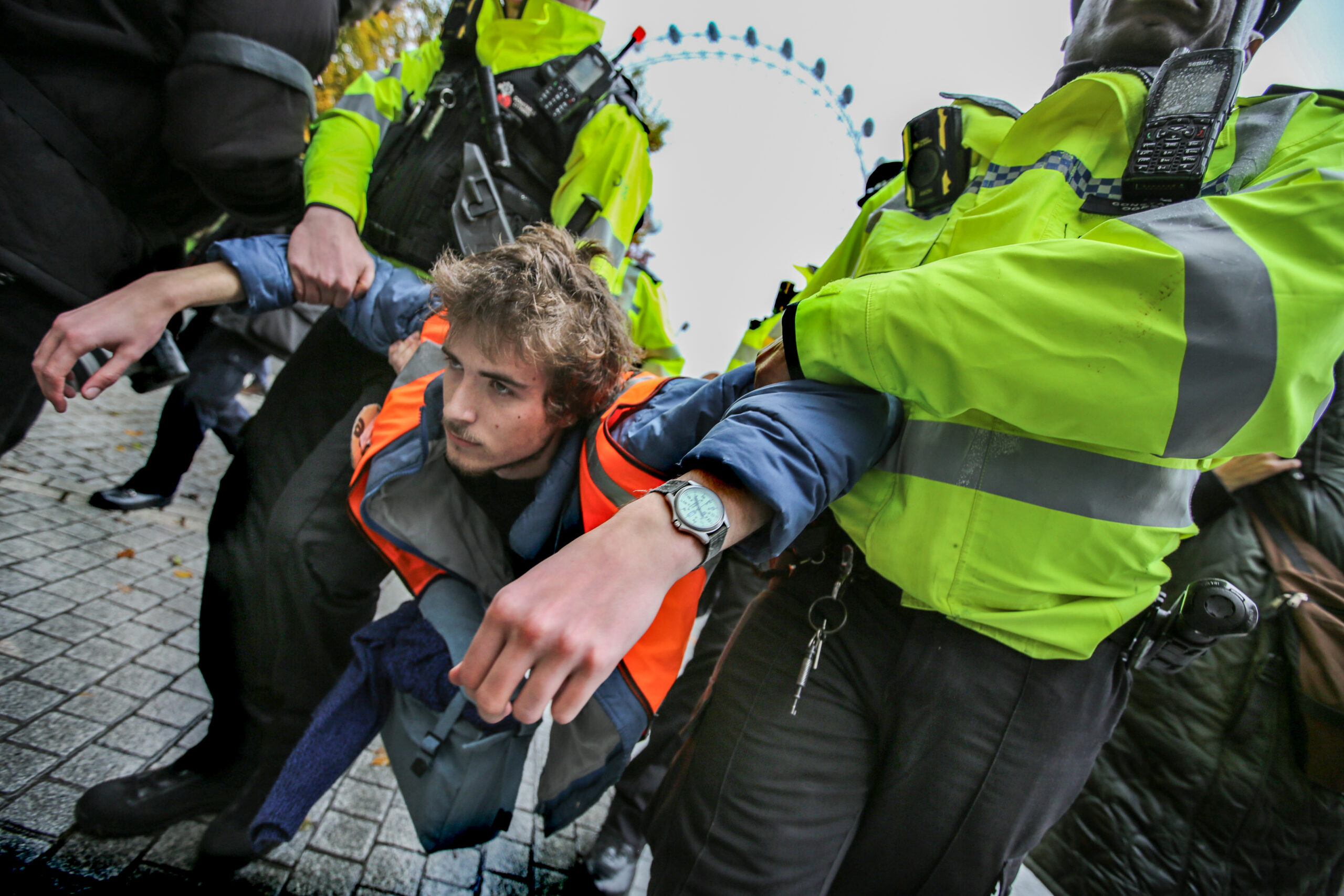
Peaceful environmental activists are policed more heavily than violent far-right agitators and are far more likely to face charges if they get arrested, new data shared with Novara Media reveals.
Freedom of Information disclosures from the Metropolitan police obtained by investigative campaigning organisation Global Witness and shared with Novara Media show that nearly 7,000 climate protesters were arrested between 2019 and mid-2025, compared with around 400 far-right agitators arrested over the same period.
While this may reflect more frequent climate protests, around 60% of the climate activists were subsequently charged, compared to only 32% of the far-right arrestees.
Following the introduction of new police powers in 2022, arrested climate activists were three times more likely to face charges – being charged around 75% of the time compared to less than 25% for arrested far-right agitators. This is despite the fact that climate protesters were overwhelmingly arrested for peaceful civil disobedience whereas the far-right activists were more likely to be detained for violent crimes.
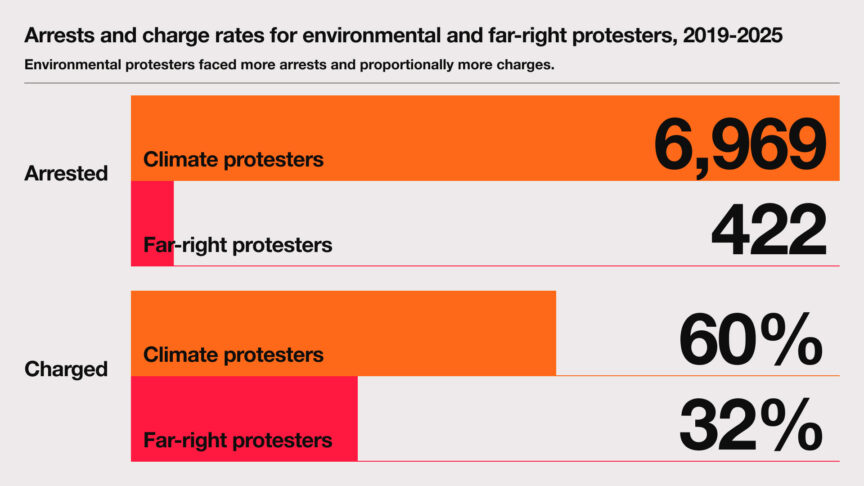
Despite a concerted crackdown launched by the police and government on climate protesters in recent years, right-wing politicians and commentators have complained of so-called “two-teir” policing supposedly discriminating against far-right activists. But this new analysis suggests that the real disparity is between the peaceful climate protesters disproportionately targeted with criminalisation compared to those on the far-right.
Global Witness campaign lead Ana Caistor Arendar said: “These figures expose a stark double standard in the policing of protest in the UK. Police are cracking down on peaceful activism demanding action to address the climate crisis, while displaying far greater leniency to those stirring up hate and violence.
“With the climate crisis accelerating, the government should be listening to those raising the alarm, not silencing them. Instead of clamping down on peaceful protest, the government must respond with the urgency this crisis demands while there is still time to act.”
Just stopping Just Stop Oil
The climate group which faced the most arrests and prosecutions was Just Stop Oil – linked to around 90% of cases between 2022 and 2025.
From 2019 onwards, the activities of Just Stop Oil and its predecessor Extinction Rebellion – which pressured the government to declare a climate emergency – were used as the premise for the Metropolitan police to lobby the government for more powers to deal with protests.
The Conservative government eventually got its way with the “deeply authoritarian” Police and Crime Act 2022, which restricted “unacceptable” protests – in spite of opposition from the Kill the Bill protest movement and civil liberties campaigners. The act granted the police new powers and criminalised non-violent activities like slow marching, locking on, roadblocks or causing “more than minor” disruption to the public.
Analysis of comparative charge rates since 2022, when the new police powers were adopted, shows that the difference in charging rates between environmental protestors and far-right activists became even more stark.
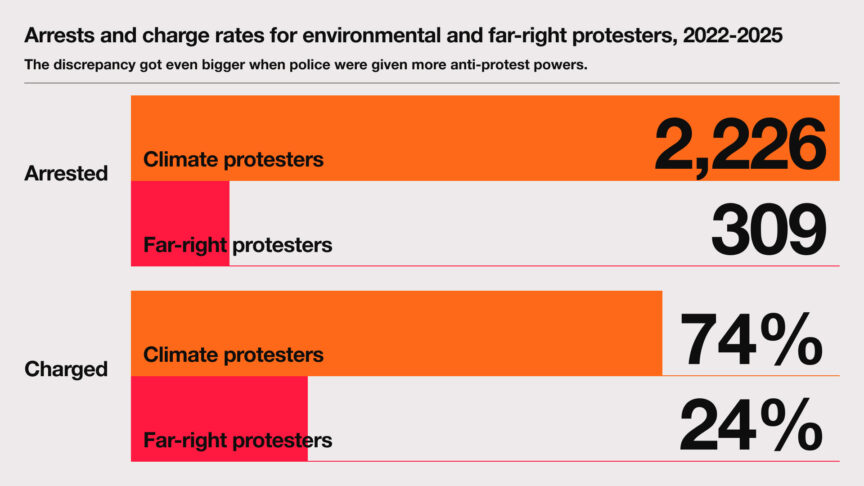
Of the 2,226 climate activists arrested in London between 2022 and mid 2025 for participating in peaceful protest, around three-quarters (1,640) were subsequently charged. This was three times the rate of charging for arrested far-right activists over the same period. Three hundred and nine far-right protesters were arrested and less than a quarter (73) were ultimately charged, despite often being implicated in violent unrest.
The top three most common offences for which climate protesters were arrested between 2022 and mid 2025 were obstruction of highways, interference with key national infrastructure, and breaching protest conditions imposed under Section 12 of the Public Order Act. A total of 85% of those arrested for these top three offences were subsequently charged.
By contrast, the three most common offences leading to arrests of far-right protesters between 2022 and mid 2025 were breach of the peace, breaches of protest conditions imposed under Section 14 of the Public Order Act and violent disorder. The average charge rate for these was just 12%.
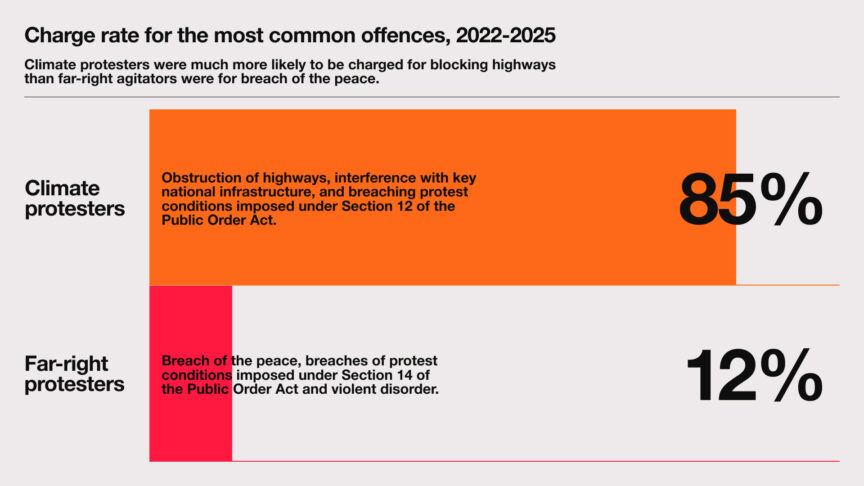
Overall, nearly half (42%) of the climate activists arrested since 2019 were targeted under laws enabling the police to place restrictions on protests.
Just Stop Oil announced that it would “hang up the high-vis” earlier this year after being subjected to an escalating campaign of criminalisation that saw dozens of its members handed prison sentences of up to five years. In a statement, the group said: “We have exposed the corruption at the heart of our legal system, which protects those causing death and destruction while prosecuting those seeking to minimise harm.”
The UK’s climate activists have also received some of the harshest sentences for peaceful protest in modern British history, including Lucia Whittaker de Abreu, who along with four other activists was prosecuted in 2024 after participating in a Zoom call to make plans to scale a gantry on the M25 motorway.
The Met Police refused an FOI request on surveillance tools used against climate activists, citing a need to protect “national security and law enforcement operations”, and saying: “confirming or denying if the Met uses specific surveillance technology against specific groups or organisations would lead to an increase of harm to covert investigations and compromise law enforcement”.
The Metropolitan Police and Home Office have been approached for comment.
Simon Childs is a commissioning editor and reporter for Novara Media.
